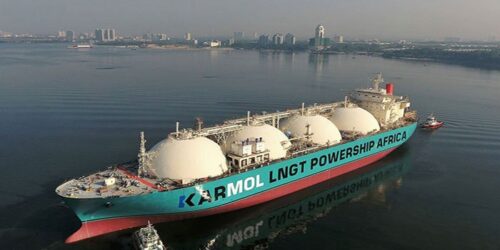An indecisive Federal Ministry of Energy dragged its feet on carrying out dry docking of most efficiently run Liquefied Natural Gas (LNG) based Floating Storage and Regasification Unit (FSRU), missing several low demand periods during mild weather and lockdowns despite repetitive reminders, The News learnt on Thursday.
As a last resort, Qatar was contacted to allow filled FSRU in place of outgoing ship with a view to saving shutdown time but that move was too late to be a starter given the documentation required for this purpose. Hence, Qatar, the principal and pioneering exporter of LNG to Pakistan was left with no option but to refuse loaded LNG ship as no time was left to fulfill altered contractual requirements in this regard, officials associated with the development confirmed to The News.
The federal government while admitting delayed dry docking a matter of serious concern has already constituted a committee under the chairmanship of Railway Minister Azam Swati to investigate the reasons behind the delay in dry docking of Engro’s FSRU and fix the responsibility for the mess.
“Pakistan State Oil (PSO) checked with provision of bringing laden cargo with Qatar Gas but they refused to accommodate request due to contractual arrangement,” said a senior official of Sui Southern Gas Company Ltd (SSGC).
Dry dock was due for the last one year. However, no attention was paid to carry it out during lean demand months especially when gas/power demand was at much lower side partly due to Covid-induced restrictions, said sources.
They regretted that policymakers did not pay any attention to reducing adverse effects of dry docking on gas supply. Such an approach required effort and was unmanageable in the short duration as Qatar government was not willing to facilitate bringing in filled ship at such a short notice, they observed.
Sources further said energy managers should have decided in advance for arranging filled-FSRU for docking in order to reduce precious time in resumption of RLNG supplies to system pack. With such an arrangement, closure could have been shortened by at about one-third time, said sources.
In 2015, filled FSRU was arranged with the cooperation of Qatar government while involving all stakeholders much prior to commissioning of first LNG import terminal, they added.
As senior official of Engro Corporation confirmed that bringing in loaded ship was not possible in the given situation.
“The government-to-government LNG agreement requires LNG to be delivered in LNG carriers at Port Qasim and limits any other vessel to bring cargoes on FOB basis. Therefore, the original plan to bring a filled FSRU had to be changed, which also increased complexity of the dry-docking activity.”
Despite this challenge, he added, Engro Elengy Terminal (Private) Limited (EETL) and Excelerate Energy met the shutdown dates by managing the channel movement of FSRU Sequoia to keep it in a cooled state. The closure time could not have been shortened further as fully optimised switch over also required 2 to 3 days, the Engro official said.
He claimed that “since its commissioning, EETL has delivered essentially non-stop operations and remained near full utilisation”. Therefore, he said there was no seasonality impact of gas supplies from the facility and LNG demand will have to be managed, regardless of summer or winter months, in case the terminal goes offline for planned maintenance.”
He recalled that EETL had been in discussion about dry docking with SSGC and all relevant government stakeholders since October 2019. It notified them about updates on dry docking on March 30, 2021, after a survey report issued by the Class Society – responsible to maintain overseas certifications of FSRU under international laws – made it clear that FSRU Exquisite must be sent for dry docking latest by June 30, 2021. The Class Society had already extended the certifications twice due to Covid-induced disruptions that led to port shutdowns and unavailability of experts. Excelerate, the US firm that owns FSRU Exquisite, had also confirmed the vessel could not be operated without Class Society certifications beyond the end of June.”
He continued to say that since the March notification, EETL had sought the flexibility and cooperation of stakeholders to find the right window for dry docking activity. However, he concluded, as the deadlock persisted for over three months, confirmed window for the activity could not be determined before June 30.
A SSGC official said efforts were made to reduce negative impact of dry dock on gas availability.
Furthermore, he added, the purpose of bringing laden cargo was to save time which would be required for cooling FSRU down. However, he claimed time had been saved by performing cooling activity simultaneously with regasification operation on 27 June, 2021.
However, he and spokesman of Ministry of Energy did not respond to queries about failing in carrying out dry dock at an appropriate time when demand was low.





